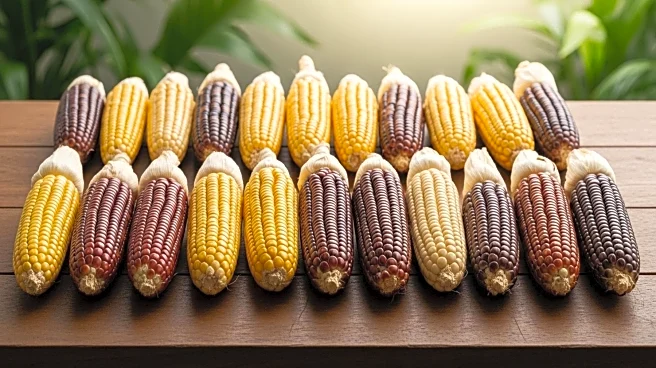What's Happening?
CIMMYT, in collaboration with the International Institute of Tropical Agriculture (IITA), has developed maize varieties that are resilient to multiple stresses such as drought, pests, and poor soil conditions. These varieties are crucial for farmers in sub-Saharan Africa, where maize is a staple crop grown on over 40 million hectares. The demand for these stress-tolerant maize varieties has surged, with 85 organizations applying for licenses to register and commercialize CIMMYT's elite maize hybrids and open-pollinated varieties in the first half of 2025, marking a 17% increase compared to the same period in 2024. This development is seen as a vital step in enhancing food security and supporting smallholder farmers in the region.
Why It's Important?
The introduction of stress-tolerant maize varieties is significant for sub-Saharan Africa, where erratic weather patterns, emerging pests, and poor soil conditions threaten agricultural productivity. By providing farmers with seeds that can withstand these challenges, CIMMYT is helping to stabilize yields and reduce risks, thereby supporting economic and food survival for millions. The widespread adoption of these varieties, which are not genetically modified, has already generated substantial economic benefits, estimated at $2.1 billion annually across developing countries. This initiative highlights the importance of public-private partnerships in agricultural development and the need for continued investment in breeding programs to meet growing demand.
What's Next?
CIMMYT plans to continue facilitating the registration and commercialization of its maize varieties by offering licenses to public and private organizations. The organization prioritizes public-sector applicants but also engages with private firms, often granting licenses royalty-free to encourage uptake. As demand for high-performing maize seed grows, CIMMYT aims to expand its collaboration with seed companies and national systems to ensure that improved seeds reach the farmers who need them most. However, funding for international breeding programs remains under pressure, and CIMMYT is calling for stronger donor investment to sustain its efforts.
Beyond the Headlines
The development of stress-tolerant maize varieties not only addresses immediate food security concerns but also contributes to long-term agricultural sustainability. By enhancing resilience to climate change and environmental stresses, these varieties support sustainable farming practices and empower smallholder farmers. The initiative also underscores the critical role of research and innovation in addressing global food challenges and the need for collaborative efforts between public and private sectors to drive impactful solutions.










